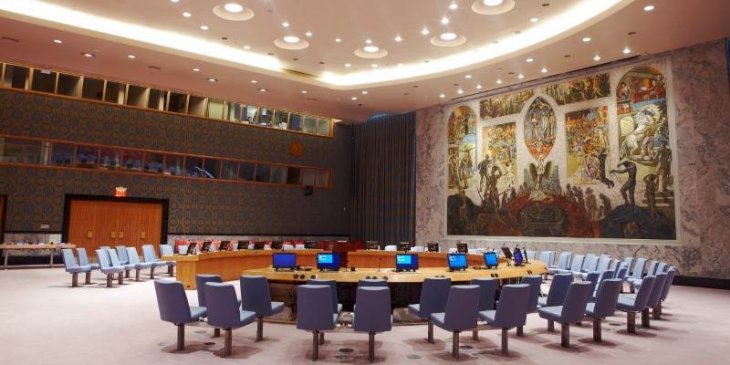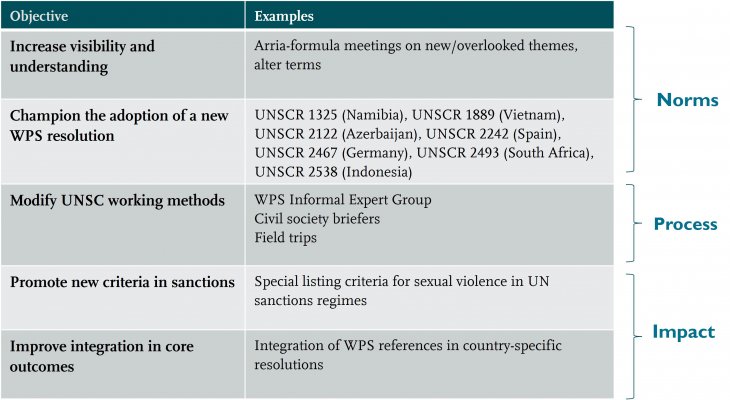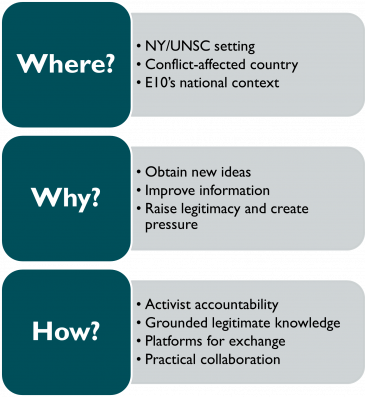On October 21, the UN Security Council (UNSC) held its annual Open Debate on Women, Peace and Security (WPS) under the presidency of Kenya, one out of ten members of the UNSC that was elected to serve by the UN General Assembly (a so-called E10 state). Kenya has joined forces with two other elected members, Ireland and Mexico, in a ‘troika’ to jointly push for WPS as these states hold three executive presidencies in the Council this autumn.
While important research has been conducted on the central role of women’s civil society organizations for establishing and promoting WPS, we know less about the role of elected states in the UNSC. What we do know is that individual E10s have played key roles in the adoption of UNSC resolutions on WPS – from Namibia in 2000 and onwards – and in efforts to realize the content of the now 10 WPS resolutions. Moreover, while there is good reason to believe that these states’ collaboration and exchange with civil society actors has been central to E10 WPS efforts, our knowledge of such “E10-civil society engagements” is even more limited.

Photo: Norwegian Ministry of Foreign Affairs
This blog post seeks to promote further policy-scholar exchange and research on this topic by centering in on the conditions under which an E10 operates in the Council, and on the role of what we can call positive E10-civil society engagements – that is, where, why, and how an E10 and civil society actors either directly collaborate or deliberately build on each other’s efforts to promote WPS. This blog post is based on a report studying Sweden’s 2017–18 UNSC term which collects existing research, in-depth interview material, and data capturing WPS developments.
What does it mean for an E10 to operate in the UN Security Council?
The UNSC is the highest decision-making body internationally. The tempo and workload are very high and the climate is harsh. As such, it is a costly arena to maneuver for an individual E10 state.
What does the Council produce? Two core outcomes are resolutions and statements. That might not seem very impressive. In addition, these outcomes are produced through negotiations. Here, it is important to remember that an elected member constitutes one out of 10 elected states. In addition, there are five states that have a permanent seat, the so-called permanent five (P5): China, France, Russian Federation, the United Kingdom, and the United States. Through their long-term presence they have procedural control and they possess the power of a veto. This means that each member, but particularly elected members, will have a limited impact on each issue or problem discussed in the Council. But if a state manages to suggest and get all to agree on, for example, concrete and action-oriented language in a resolution, then that can have critical effects in the lives of people in conflict areas or on the personnel that the UN deploys around the world. There is always someone on the receiving end of the Council’s decisions. If we scrutinize this situation even more in-depth from a WPS perspective, this also means that the content of each decision is key for understanding how it can affect the lives of women in conflict areas. This is critical, as we know that WPS in part came out of the fact that the UNSC did not explicitly or systematically consider women’s security, women’s agency for peace, or the impact of war on women, prior to 2000.
How can an E10 work to promote WPS during its (short) time in the UNSC?
An elected member serves on the UNSC for two years. What objectives an E10 can seek to achieve on WPS during its rather short timeframe is a complex question, particularly if we remember that each decision in the UNSC is the outcome of a negotiation.
That said, if we simplify, we can say that an E10 can strive to affect three key areas: 1) The normative resolution framework that, in a way, forms the WPS mandate of the UNSC; 2) the processes through which the Council operates; 3) the content of regular UNSC decisions in order to have a positive impact on the security and participation of women in a conflict area.

Let us look a bit closer at these objectives, starting with the first: affecting the norms set in the WPS resolution framework. An E10 can try to affect the framework in several ways, for example:
Increase visibility and understanding
This can involve promoting dialogue and debate on an overlooked WPS aspect or raising issues regarding the terminology that is being used to describe a problem, for instance to move away from using terms such as victim to instead using the word survivor. In practice, examples of what this can entail can be to arrange an Arria-formula meeting or, if the country holds the UNSC presidency in October, suggest a theme for the annual Open Debate on WPS. In such efforts, E10-civil society engagement can involve collaboration to identify existing gaps, exchange information and ideas, or to identify briefers.
Champion the adoption of a new WPS resolution
An E10 can also strive to address potential gaps in the thematic framework even more directly by championing a new resolution. As we can see from the figure, a number of WPS-related resolutions have been adopted under an E10 presidency or have been promoted by E10s.
Recently, however, there are arguments raised that the WPS framework should be considered as rather well-developed and that we should try to move toward implementing existing decisions. This is a position forwarded by many civil society members.
One way to move toward implementation is to strengthen and modify the processes under which the UNSC operates and makes its decisions. This is the second area where an E10 can seek to have an effect.
Modify the UNSC working methods
The UNSC operates by rules and established practice, that is, by formal and informal working methods. While these methods are resistant to change, it is possible for an E10 to strive to modify the processes so that these can become better at consistently addressing WPS. For example, we have seen a growing practice of inviting in civil society briefers to the Council debates, something which can be used to give women’s organizations from conflict areas a direct voice in ongoing UNSC discussions. There have also been efforts made to modify how the UNSC field visits are arranged in order to ensure that members meet with women’s organizations. As captured, these efforts can directly and indirectly involve engagement between E10s and civil society.
The third area where an E10 can seek to have an effect is by trying to improve the chances for a positive impact in a conflict-affected country directly by seeking to integrate WPS in regular UNSC decisions.
Promote new criteria in sanctions
Sanction regimes have become an increasingly common tool used by the UNSC. There have been systematic efforts to integrate criteria in sanction regimes that take WPS aspects into account. For example, Sweden promoted special listing criteria for sexual violence in several UN sanctions regimes.
Improve integration in core outcomes
Finally, an E10 can work to support the integration of the content of the WPS resolutions into some or all regular UNSC outcomes – resolutions, presidential statements, press statements, and press elements – where resolutions can be seen as having the largest potential for a positive effect in the conflict area. For example, Sweden worked to make WPS “core Council business” by striving to integrate language on WPS in resolutions and statements.
As regards impact, E10-civil society engagement can involve jointly identifying central areas where there is need for stronger formulations on WPS in a specific country situation – something which requires concrete and detailed information. It can also involve political and social pressure for change.
What does this tell us about the where, why, and how of E10-civil society engagement?
As the above discussion demonstrates, there are a number of objectives that an E10 can try to achieve where civil society engagement can be central for success. This is an area in need of much further analysis and discussion, but let us sum up some critical points related to “the where, the why and the how” of E10-civil society engagement.

Where does it take place?
- In the New York/UNSC setting. Several non-governmental organizations and think tanks operating in the context of UN New York have a focus on the work of the Council directly, such as the NGO Working Group on WPS.
- In a conflict-affected country that is on the Council’s agenda. Many E10s engage directly with women’s organizations, other civil society organizations, and the state in the conflict-affected area, often through its embassy.
- In the E10s’ national context. An E10 can engage with the civil society in its own state. For example, the Swedish Ministry for Foreign Affairs (MFA) cooperated with organizations, such as the Kvinna till kvinna Foundation, during its term. In addition, the MFA created a reference group including scholars, civil society, and state agencies.
Why do E10s and civil society engage?
The reasons can be many. Over time, we have seen direct collaboration or efforts to jointly build on each other’s work in order to:
- Obtain new ideas and knowledge on how to move forward on WPS. This was critical in the conception of the WPS framework. Today, an exchange of ideas and knowledge can be important as an elected state prepares for its time in the Council. For example, a state can be assisted by informed dialogues to identify concrete gaps in WPS debates and implementation that it can address during its term. In turn, through an exchange, civil society obtains an opportunity to forward its interests and concerns directly to an incoming decision-maker at the UNSC. Another example is that some civil society organizations offer training on WPS to incoming elected members in order to support progress on WPS.
- Improve access to updated information. As the saying goes, information is power. The UNSC moves quickly, and an E10 needs to continuously obtain correct and updated information from a range of conflict areas around the globe in order to be able to promote WPS in a relevant manner. Women’s organizations can often provide such concrete information on areas of concern to an E10. Civil society, in turn, are often dependent on E10s in order to obtain an updated understanding of ongoing discussions and conditions in the UNSC in order to promote civil society interests in a targeted manner.
- Raise legitimacy and create pressure. While it is safe to say that the UNSC has a legitimacy problem overall, the E10s are elected by the UN General Assembly. Many E10s have taken that as involving a responsibility to consult and to forward views from a range of actors to improve the legitimacy of the decisions from the UNSC. Civil society engagement is central in that respect. Many civil society organizations active in New York often have broad global networks and thereby collect and forward a range of different voices and perspectives. Moreover, civil society campaigns and lobbying for certain WPS aspects create pressure that is useful for an E10 as it pushes for WPS from what often is a disadvantaged position in the UNSC.
How do E10s and civil society engage?
There exist a range of different approaches, of which a few are visible in our report:
- Activist accountability. As observed, an E10 can capitalize – and even be dependent – on civil society campaigns that create pressure for change on WPS. At times, such campaigns and pressure tools can even be the result of E10-civil society dialogues on mutual problems. For example, the NGO Working Group on WPS regularly publishes the Monthly Action Points (MAP). MAP presents demands on what the working group expects the UNSC to do in range of different country contexts each month. In part, the MAP came about due to a dialogue between the NGO Working Group and Switzerland during its last UNSC term as they were looking for access to better information on WPS that could be used to strengthen UNSC efforts. In addition to publishing monthly demands, the MAP has created an accountability mechanism that can be used by E10s to compare UNSC outcomes to external expectations.
- Grounded legitimate knowledge. Overall, there is a recognized need to move away from generic WPS language in resolutions to instead include more concrete formulations that address context-specific demands and problems. Women’s organizations from conflict areas can brief the UNSC and provide information and arguments that are perceived to be both grounded in actual problems and legitimate in negotiations in a way that is not always possible for an E10 to produce itself. Though not always an unproblematic setup, this practice does allow for women from conflict areas to get their demands presented to the UNSC more directly.
- Mutual platforms for exchange. An E10 can contribute to creating platforms for civil society actors to communicate with the UNSC – at briefings, in Arria-formula meetings, during field visits, or in written form. Civil society organizations can provide platforms for an E10 to discuss critical questions in seminars and events that allow the E10 to be part of a broader debate, something which also allows for presenting its agenda and explaining its decisions to a broader public.
- Practical collaboration. There exist a number of practical ways in which an E10 and civil society can collaborate. For example, Sweden and other E10s have worked together with the NGO Working Group on WPS to increase the number of women civil society briefers. Civil society organizations can also be reliant on funding from E10s in order to continue their work on WPS.
Concluding
As this blog post has demonstrated, there exist a number of entry-points for further research and policy-research exchange on the role of E10-civil society engagement that would allow us to move forward on understanding both the dynamics of the Council and the role of such engagements in the trajectory of WPS. While this post has limited its focus to positive engagements, further research should additionally recognize that neither the E10 group nor civil society are homogenous and that interests do not always align. There exist many tensions, and also often outright heated engagements, in various E10-civil society constellations in the UNSC context that are relevant to study. That said, centering in on positive engagement was here used as a way to structure one form of insights that are relevant for research on WPS and that can serve as a starting point for studying engagements when promoting other cross-cutting themes on the UNSC agenda, such as climate, youth, or health.
Acknowledgements
This blog post is based on research reflections developed for the Nordic Africa Institute (NAI)/PRIO/University of Pretoria webinar Looking Back and Reflecting: Sweden’s Engagement with Civil Society in 2017-18 on October 12. The webinar also included presentations by Per-Axel Frielingsdorf, Counsellor, Former Co-chair, Informal Working Group-WPS and WPS Lead, Swedish Permanent Mission to the UN (2017–2018), Klara Backman, Advocacy Advisor, Kvinna till Kvinna (a recording of the event can be found in the link). Olsson’s blog and research reflections are based on the PRIO Paper: Sweden as an Elected Member of the UN Security Council: Promoting Women, Peace and Security as Core Council Business, 2017–18, the NAI-led project Shattering Glass, in which PRIO collaborates with NAI and the University of Pretoria, and lessons from the Dialogue Forum or Norway’s membership in the United Nations Security Council, conducted in cooperation with NUPI.